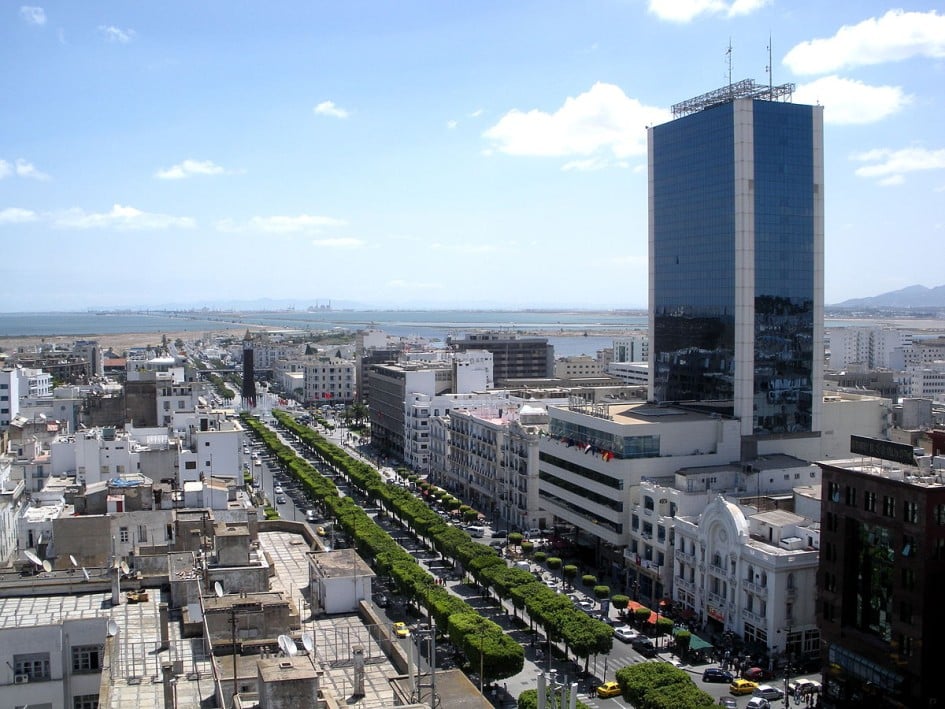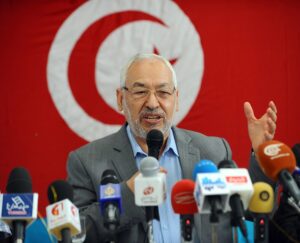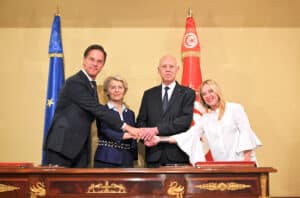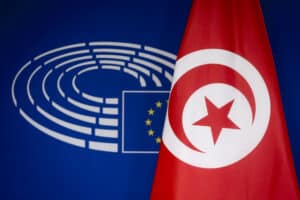Avenue Habib Bourguiba in Tunis (source: Wikimedia Commons)
This Saturday, thousands of protesters marched the streets of Tunis, denouncing President Kais Saied’s slow move towards authoritarianism. The protesters chanted slogans like: “down, down,” “revolution against dictator Kais,” and “the coup will fall.” Critics have accused the Tunisian president of carrying out a coup, since he invoked emergency measures and suspended parliament on July 25, 2021.
Divided opposition
Two parallel demonstrations were organized on Saturday, by parties that fundamentally oppose each other. One protest was initiated by the National Salvation Front, a coalition of parties led by the moderate Islamist Ennahda Party, the other by the secular Free Destourian Party. Some scholars have blamed the lack of successful political resistance to Saied’s slow power grab on polarization and disagreements within the opposition.
Nonetheless, both parties accuse Saied of carrying out an unconstitutional coup. In September, the National Salvation Front called for boycotting the country’s parliamentary elections, scheduled next December. According to Ahmed Nejib Chebbi, the head of the alliance, the elections will be organized under the supervision of a body that is “not neutral and loyal to the ruling authority.”
Financial crisis
In addition to denouncing Saied’s coup, the protesters demanded action in the food, water and energy shortages Tunisia is currently facing. The country is struggling with a severe financial crisis, deepened by supply shortages in the wake of the Russian invasion in Ukraine. In September, demonstrators also took to the streets to call for solutions to the general lack of sugar, cooking oil, milk, and rice, the rising energy prices, and the high inflation rate of 9%. Angered crowds chanted: “jobs, freedom and national dignity,” “we can’t support crazy price hikes,”, and “where is the sugar?”. Images on social media show supermarkets’ empty shelves and customers fighting for a pack of sugar. The country is currently negotiating a bailout loan from the International Monetary Fund of about 2 billion dollars.
Support Saied
Saied, a former professor of constitutional law, won the presidential elections of 2019 as an independent candidate, presenting himself as an outsider from the Tunisian political establishment. His victory primarily relied on votes from young Tunisians, who were disillusioned with politics and suffered from high unemployment rates.
Saied implemented emergency measures and suspended parliament on July 25, 2021, following months of protests. Demonstrators demanded solutions for the high unemployment rates, the corona crisis, police brutality and corruption. Since, Saied has solidified his one-man-rule, by officially dissolving parliament, seizing control of the electoral commission, and enshrining his powers through a constitutional referendum.
Initially, Saied’s move received widespread support from the Tunisian population, with polls measuring around 87% approval rates for Saied’s actions. Critics have accused Saied of democratic backsliding and carrying out a coup.
“The only Arab democracy”
Saied’s power grab came as a surprise to many. After the Arab Spring of 2010/2011, in which protesters around the Arab World had taken to the streets to demand social justice and political freedom, Tunisia was the only country to establish a successful democratic system. Western observers and policy makers hailed Tunisia as a success story, dubbing it “the only Arab democracy”. But they overlooked the growing political disillusionment among many Tunisians, who had become increasingly disenchanted with the country’s widespread corruption and worsening economic conditions.
Parliamentary elections are scheduled later this year, on December 17. In the meantime, Tunisia’s political crisis is deepening, and its economic crisis worsening. At the same time, Saied still holds support from a significant share of the Tunisian population. The former law professor continues to be seen as a beacon of hope in a corrupt political system by many.
Sources: BBC, Al Jazeera 1, Al Jazeera 2, Morocco World News
Photo: Wikimedia Commons



